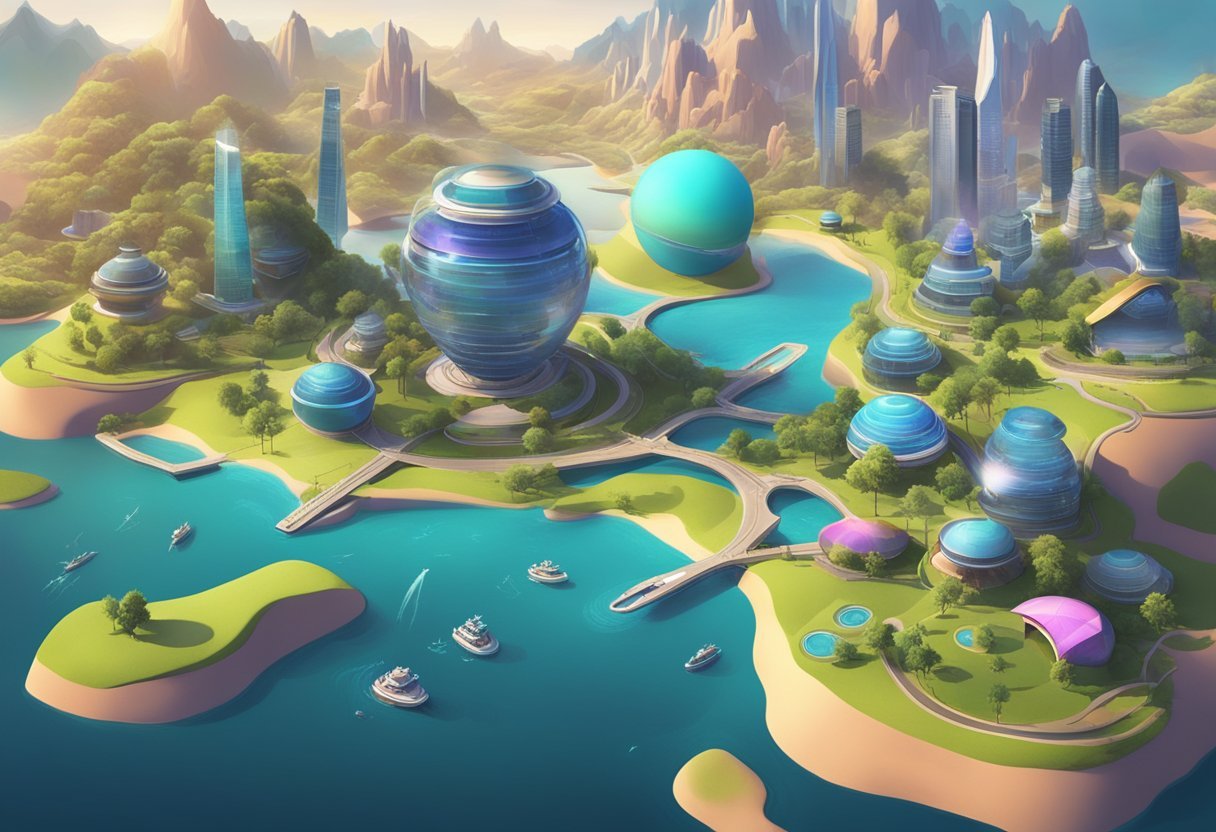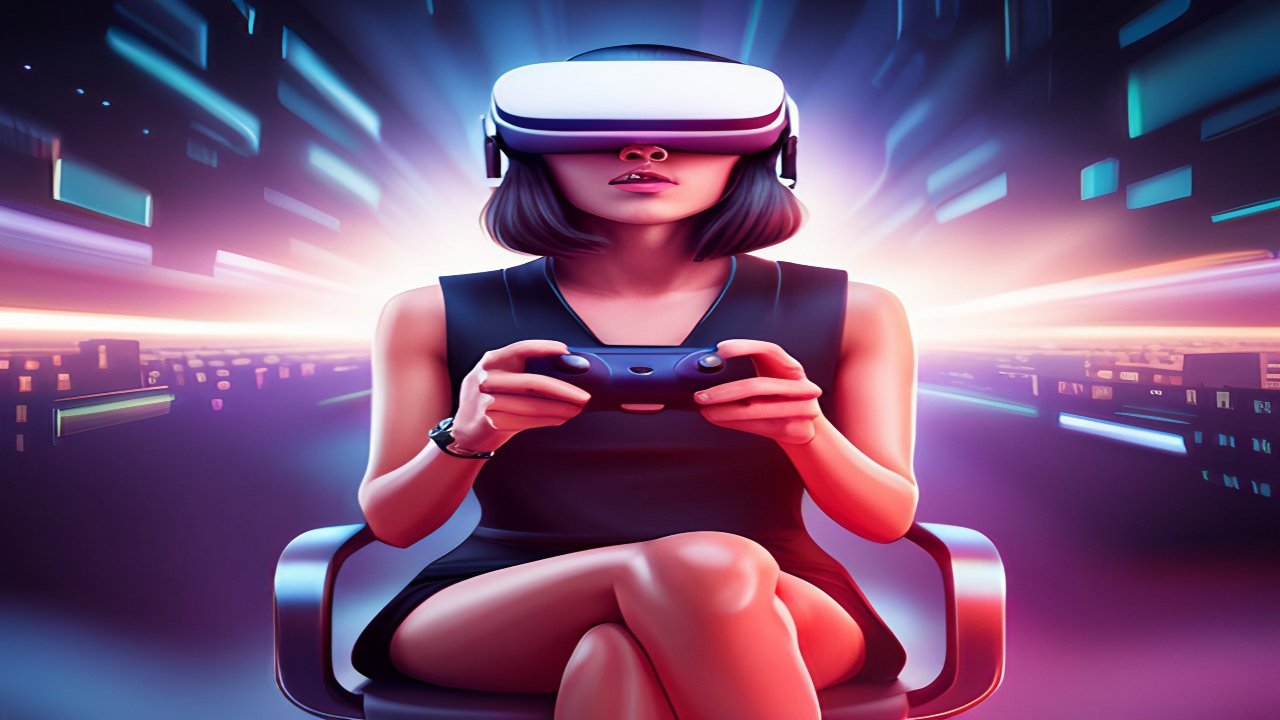The Metaverse is an emerging concept that has been gaining traction in recent years. It refers to a virtual space where users can interact with each other and with digital objects in a way that mimics the real world. The idea of the Metaverse is not new, but recent advances in technology have made it more feasible than ever before. In this blog post, we will discuss Metaverse Ideas. I will share with you the top 10 most realistic Metaverse ideas to help you get started on your project.
Virtual Reality (VR) and Augmented Reality (AR) are two technologies that are often associated with the Metaverse. VR allows users to enter a completely digital world, while AR overlays digital objects onto the real world. Both technologies have the potential to create immersive experiences that are similar to those found in the Metaverse.
As the Metaverse becomes more of a reality, people are starting to explore the possibilities that it offers. There are many ideas for how the Metaverse could be used, ranging from entertainment to education to commerce. Some of these ideas are more feasible than others, but all of them are worth considering as we move towards a more connected digital future.
Evolution of the Metaverse
Historical Milestones
The concept of the metaverse has been around for decades and has its roots in science fiction. However, it was not until the emergence of the internet and the development of virtual reality technology that it became a tangible idea.
One of the earliest examples of a metaverse-like platform was Second Life, launched in 2003, which allowed users to create avatars and interact with each other in a virtual world.
In 1992, Neal Stephenson coined the term “metaverse” in his science fiction novel Snow Crash, which described a virtual reality space where people could interact with each other and with digital objects. This idea of a shared virtual space became a popular concept in science fiction and influenced the development of the metaverse.
Key Players in Development
The development of the metaverse has been driven by a number of key players in the technology industry. One of the pioneers of the metaverse was Linden Lab, the creator of Second Life. The platform was a huge success and demonstrated the potential of virtual worlds as a new form of social interaction.
In recent years, the concept of the metaverse has gained renewed interest with the release of the novel and movie Ready Player One, which depicted a fully immersive virtual world. This has led to increased investment in virtual reality technology and the development of new metaverse-like platforms.
The metaverse has come a long way since its inception in science fiction. With the continued development of virtual reality technology, it is likely that we will see even more innovative metaverse platforms in the future.
Top 10 Metaverse Ideas
The metaverse is a virtual world that is growing in popularity and attracting attention from various industries. Here are 10 metaverse ideas that are being explored by individuals and organizations:
- Collaborative VR art galleries
- Virtual historical simulations
- AI-powered language learning adventures
- Decentralized healthcare clinics
- Immersive intergalactic tourism
- Gamified education platforms
- Personalized dream simulation hubs
- Open-source world-building projects
- Collaborative augmented reality concerts
- Emotion-triggered scent landscapes
Collaborative VR Art Galleries
Collaborative VR art galleries are a unique way for artists to showcase their work in a virtual space. These galleries allow multiple artists to display their work in a single virtual environment, allowing for a more immersive and interactive experience for viewers. Collaborative VR art galleries can also be used for art auctions and sales.
Virtual Historical Simulations
Virtual historical simulations allow users to explore and experience historical events and places in a virtual environment.
These simulations can be used for educational purposes, allowing students to learn about history in a more interactive and engaging way. Virtual historical simulations can also be used for tourism, allowing individuals to explore historical sites without leaving their homes.
AI-Powered Language Learning Adventures
AI-powered language learning adventures are a fun and interactive way for individuals to learn a new language. These adventures use AI to create personalized language learning experiences for each user, allowing them to learn at their own pace and in their own way. AI-powered language learning adventures can also be used for corporate training and education.
Decentralized Healthcare Clinics
Decentralized healthcare clinics are virtual clinics that provide healthcare services to individuals in remote areas. These clinics use virtual reality technology to provide medical consultations, diagnosis, and treatment to patients. Decentralized healthcare clinics can also be used for medical research and training.
Immersive Intergalactic Tourism
Immersive intergalactic tourism allows individuals to explore and experience space in a virtual environment. These experiences can be customized to provide unique and personalized experiences for each user. Immersive intergalactic tourism can also be used for corporate events and team building exercises.
Gamified Education Platforms
Gamified education platforms are educational platforms that use gamification to make learning more engaging and fun. These platforms use game mechanics such as points, badges, and leaderboards to encourage users to learn and engage with the content. Gamified education platforms can also be used for corporate training and education.
Personalized Dream Simulation Hubs
Personalized dream simulation hubs allow individuals to explore their dreams in a virtual environment. These hubs use AI and virtual reality technology to create personalized dream simulations for each user. Personalized dream simulation hubs can also be used for therapy and mental health treatment.
Open-Source World-Building Projects
Open-source world-building projects are collaborative projects that allow individuals to create and build virtual worlds together. These projects use open-source software to allow for easy collaboration and development. Open-source world-building projects can also be used for corporate events and team building exercises.
Collaborative Augmented Reality Concerts
Collaborative augmented reality concerts allow individuals to experience live music performances in a virtual environment. These concerts use augmented reality technology to create an immersive and interactive experience for viewers. Collaborative augmented reality concerts can also be used for corporate events and product launches.
Emotion-Triggered Scent Landscapes
Emotion-triggered scent landscapes are virtual environments that use scent to create an immersive and emotional experience for users. These landscapes can be used for therapy, mental health treatment, and stress relief. Emotion-triggered scent landscapes can also be used for marketing and advertising purposes.
These are just a few of the many metaverse ideas that are being explored by individuals and organizations. As the metaverse continues to grow, we can expect to see even more innovative and exciting ideas emerge.
Technological Foundations
The metaverse is built on a variety of technologies that work together to create a seamless and immersive digital experience. This section will explore some of the technological foundations of the metaverse, including virtual and augmented reality, blockchain and NFTs, and artificial intelligence and IoT.
Virtual and Augmented Reality
Virtual and augmented reality technologies are essential to the metaverse, as they provide the entry points for users to enter and interact with the digital world. These technologies allow users to experience a fully immersive environment that feels like a natural extension of the real world.
Virtual reality (VR) creates a completely artificial environment that users can interact with using specialized headsets and controllers. Augmented reality (AR), on the other hand, overlays digital information onto the real world, typically using a smartphone or tablet.
Together, these technologies provide the foundation for the metaverse, allowing users to explore and interact with digital spaces in a way that feels natural and intuitive.
Blockchain and NFTs
Blockchain technology and non-fungible tokens (NFTs) are also critical components of the metaverse. Blockchain provides a decentralized and secure way to store and transfer digital assets, while NFTs allow for the creation and ownership of unique digital assets.
In the metaverse, blockchain and NFTs are used to create and manage digital assets such as virtual real estate, avatars, and other in-game items. These assets can be bought, sold, and traded just like physical assets, providing a new way for creators and users to monetize their digital creations.
Artificial Intelligence and IoT
Artificial intelligence (AI) and the internet of things (IoT) are also important technologies in the metaverse. AI can be used to create intelligent NPCs (non-player characters) that can interact with users in a more natural and realistic way, while IoT devices can be used to create a more immersive and interactive environment.
For example, IoT devices could be used to create smart homes within the metaverse, allowing users to control their virtual environment using voice commands or other natural interactions. AI could also be used to create more intelligent and responsive NPCs, making the metaverse feel more like a living, breathing world.
The metaverse is built on a complex web of technologies that work together to create a seamless and immersive digital experience. By leveraging the latest advances in virtual and augmented reality, blockchain and NFTs, and AI and IoT, creators and users can build and explore a world that feels like a natural extension of the real world.
Metaverse Applications
Gaming and Entertainment
The metaverse has already made significant inroads in the gaming and entertainment industry. Games like Fortnite and Minecraft have already created their own metaverse-like worlds, allowing players to immerse themselves in a virtual environment.
The metaverse has the potential to revolutionize the gaming industry by creating fully immersive gaming experiences that blur the line between the real and virtual worlds.
Education and Training
The metaverse can provide innovative and practical applications in the fields of education and training. Remote learning has become increasingly popular in recent years, and the metaverse can take this to the next level by creating fully immersive training environments.
The Horizon Workrooms is an excellent example of how the metaverse can be used in education and training. It is a virtual workspace that allows remote teams to collaborate and interact with each other in a virtual environment.
Virtual Workspaces
The metaverse can also be used to create virtual workspaces that allow employees to collaborate and work together in a virtual environment. This concept has become increasingly popular in recent years, especially with the rise of remote work.
The Horizon Workrooms is an excellent example of how the metaverse can be used to create virtual workspaces. It provides a fully immersive virtual environment that allows remote teams to collaborate and work together seamlessly.
The metaverse has the potential to revolutionize the way we work, learn, and play. As technology continues to advance, we can expect to see more innovative and practical applications of the metaverse in various fields.
Economic Impact
The Metaverse is a virtual world where people can interact with each other in real-time, creating new opportunities for businesses to grow and expand.
With the rise of the Metaverse, there are several ways in which it can impact the economy. This section will focus on two major areas: Digital Commerce and Advertising and Marketing.
Digital Commerce
Digital commerce is a major component of the Metaverse economy. Cryptocurrency is one of the most important aspects of digital commerce in the Metaverse. It is a decentralized digital currency that can be used to buy and sell goods and services.
The Metaverse has created a new market for digital art, which can also be bought and sold using cryptocurrency. This has led to the emergence of new marketplaces where digital art can be sold, such as Nifty Gateway.
Gucci, a luxury fashion brand, has already entered the Metaverse by launching its own virtual store. This is a significant move for the fashion industry, as it creates new opportunities for businesses to connect with customers in a virtual environment.
As more businesses enter the Metaverse, it is likely that the use of cryptocurrency for digital commerce will continue to grow.
Advertising and Marketing
Advertising and marketing are other important areas where the Metaverse can have a significant impact. Targeted advertising is one of the most important aspects of advertising in the Metaverse.
In the Metaverse, businesses can target specific groups of people based on their interests and behaviors. This allows businesses to create more personalized advertising campaigns that are more likely to be effective.
Coca-Cola is one of the first major brands to enter the Metaverse with its virtual billboard campaign. This campaign allowed users to interact with virtual billboards and earn rewards for doing so. This is an example of how advertising can be integrated into the Metaverse in a way that is engaging and interactive.
The Metaverse has the potential to create new opportunities for businesses in the areas of digital commerce and advertising and marketing. As more businesses enter the Metaverse, it is likely that the use of cryptocurrency for digital commerce and targeted advertising will continue to grow.
Social and Ethical Considerations
The metaverse presents a new frontier for social interaction and entertainment, but it also raises important social and ethical considerations. This section will explore some of these considerations, including privacy and personal data, as well as inclusivity and accessibility.
Privacy and Personal Data
As with any technology that collects personal data, the metaverse raises concerns about privacy. Users of the metaverse will generate large amounts of personal data, including information about their virtual activities, preferences, and behaviors.
This data could potentially be used for targeted advertising or other purposes, and users may not always be aware of how their data is being used.
To address these concerns, companies developing the metaverse should prioritize transparency and informed consent when collecting and using personal data. This could include providing clear and concise privacy policies, as well as giving users control over their data and how it is used.
Inclusivity and Accessibility
The metaverse has the potential to be a more inclusive and accessible space than traditional social media platforms, but it also presents unique challenges. For example, users with disabilities may face barriers to accessing and participating in the metaverse, such as navigating virtual environments or interacting with other users.
To address these challenges, companies developing the metaverse should prioritize accessibility and inclusivity from the outset. This could include designing virtual environments with accessibility in mind, as well as providing tools and resources to help users with disabilities participate fully in the metaverse.
Companies should be proactive in addressing issues such as abuse and misinformation in the metaverse, in order to create a safe and welcoming environment for all users.
Frequently Asked Questions
How can businesses leverage virtual reality in the metaverse?
Businesses can leverage virtual reality in the metaverse by creating immersive experiences for their customers. For example, they can create virtual showrooms where customers can explore their products in a 3D environment. Virtual reality can also be used for employee training, where employees can practice their skills in a simulated environment. Businesses can use virtual reality to hold virtual events and conferences.
What are the potential uses of the metaverse for education and training?
The metaverse has the potential to revolutionize education and training by providing immersive and interactive learning experiences. For example, students can explore historical events or scientific concepts in a virtual environment. Training programs can also use virtual reality to simulate real-life scenarios and provide employees with hands-on experience.
What types of entertainment experiences can be created within the metaverse?
The metaverse offers endless possibilities for entertainment experiences. Users can attend virtual concerts, visit virtual theme parks, or participate in virtual sports events. They can also create their own virtual worlds and games, providing a new level of creativity and engagement.
How might the metaverse change the way we interact socially and professionally?
The metaverse has the potential to change the way we interact socially and professionally by providing a new level of immersion and connection. Users can interact with each other in a virtual environment, creating a sense of presence and shared experience. This can lead to new forms of collaboration and networking, as well as new opportunities for socializing and entertainment.
What are the main ideas of metaverse?
The main idea of the metaverse is to create a shared virtual environment where users can interact with each other and digital content. It is a convergence of virtual reality, augmented reality, and other technologies that enable users to experience a seamless and immersive digital world.
In what ways could the metaverse contribute to the evolution of e-commerce?
The metaverse has the potential to revolutionize e-commerce by providing a new level of engagement and personalization. Users can explore virtual stores and products in a 3D environment, creating a more immersive and interactive shopping experience. Businesses can use virtual reality to showcase their products and services in a more engaging way.
What could we do in the metaverse?
The possibilities of what we can do in the metaverse are endless. Users can explore virtual worlds, attend virtual events, socialize with other users, and create their own virtual content. They can also use the metaverse for education, training, and business purposes.
What are the business ideas in metaverse?
There are numerous business ideas in the metaverse, including virtual real estate, virtual advertising, and virtual events. Businesses can also leverage the metaverse for employee training, customer engagement, and product development. The metaverse provides a new level of creativity and innovation for businesses to explore.




